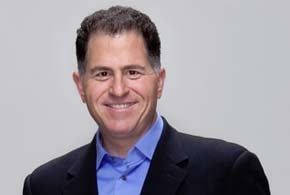Michael Dell is having more fun running his eponymous company now that it is private, and he and his executive team have more time to spend with customers. Dollars that previously went toward servicing Wall Street obligations are now going back into innovation—to customers’ benefit, the Dell CEO added.
Working through the channel to sell Dell products and services is a critical component of the company’s evolving go-to-market strategy.
“We’re going to be relying a lot more on channel partners; as we focus more on solutions and services, it changes the nature of the relationship,” said Dell. “Many of them, by the way, are now setting up actual Dell practices.”
The challenge for solution providers in the channel will be adjusting their own services as vendors like Dell continue to build out more sophisticated offerings for which much of the management of those products is highly automated, in lieu of using traditional methods of manual deployment.
In contrast to its competitors, Dell has a comparatively small services organization generating $9 billion in revenue. Part of the effort to compensate for that involves using the channel to deliver those services. To that end Michael Dell, at the Dell World 2013 conference (Dec. 11 to 13), announced that the company identified 250,000 accounts in which customers have only one or two Dell products installed that partners can target and that it will give Dell salespeople an additional 20 percent increase in commission on select Dell products sold through the channel.
Dell announced it is putting $300 million into a Dell Venture Fund that is going toward the development of products and technologies that will find their way into the Dell portfolio. The company plans to invest the money in areas that the company has expressed interest in, including cloud computing, big data, next-generation data centers, mobility and storage. Dell also announced the formation of a research and development division focused on organically developing technologies that will become part of Dell’s portfolio five to 10 years out.
A Channel Concern
A primary concern for solution providers in the channel is the level of support Dell will be able to continue to provide.
“The only thing I fear is that [they] won’t be able to afford to provide the same level of support they have been providing,” says Kyle Blackmore, president of Blackmore Computer Services.
Like a lot of Dell partners, Blackmore relies heavily on Dell support that is generally well thought of at the enterprise level. Any pullback there would be in order to pay down debt would inevitably affect both the bottom line of solution providers and the quality of the customer experience.
While some critics of Dell’s going private have cited the costs associated with servicing that amount of debt as an issue that would cripple the company’s ability to invest in innovation, Dell said the exact opposite is the case
“Those people can’t do math,” said Dell. “All that money that was being used to pay for financial services to is now being invested in innovation.”
Financial Positioning
Strong cash flow is already being used to pay down the debt generated by the leveraged buyout that took the company private, Dell said, adding that not being beholden to Wall Street now allows Dell to focus on longer-term issues.
“When we went public, we did it to get access to capital and be better known,” said Dell. “Now, we have plenty of capital and are pretty well-known.”
Capitalizing on historically low interest rates to go private, the company is already using its well over $2 billion in annual cash flow to pay down that debt, Dell said.
As Dell continues to function as both a manufacturer and a reseller of third-party offerings such as cloud services from Google and Microsoft, solution providers will individually have to determine how far up the Dell product stack they will want to go.
Dell remains locked in a dogfight with Hewlett-Packard for dominance of the x86 server market, while continuing to expand its enterprise software portfolio. Michael Dell appears to relish this fight more now that the company is private.
“I get to spend a lot more time with customers now,” Dell said. “The stress is less, and I’m having a lot more fun.”
Michael Vizard has been covering IT issues in the enterprise for 25 years as an editor and columnist for publications such as InfoWorld, eWEEK, Baseline, CRN, ComputerWorld and Digital Review.

